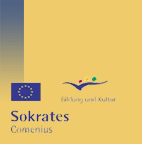|
Activity 2: The earth is a large magnet - magnets repel and attract
each other.
|
Magnetism
|
|
Target group: children of 3 to 6 years in kindergarten
|
Aim: Experience and recognize that magnets are
attracted by the North
and South Poles of the
earth.
|
|
Where: group area, laboratory, small room
|
How long? Approx. 40 minutes
|
What? By purposefully employing magnets the
children experience and recognize that the earth is a large magnet.
|
|
Preparation:
Globe, compasses, magnets
showing a polar bear at their North Pole and a penguin at their South Pole
(see picture 1). Poster of the globe on which the North and South Poles have
been marked (see picture 2). Story of Elmar, the little polar bear, and
Pauline, the little penguin lady (see appendix).
|
Steps:
The children briefly report on the results of the first activity. The nursery
school teacher places a globe into the centre of the circle, the children
look at the globe and say what they know or think about it. Together they
decide where the North and South Poles are and they think about which animals
live at the North and which animals live at the South Pole. In addition the
nursery school teacher shows the children the poster with the animals at the
two Poles and makes a connection with the names of the magnets poles. Now
the story about the polar bears and the penguins is told to the children.
After this the labelled magnets are handed out to the children and they find
out which poles attract and which poles repel each other. The nursery school
teacher summarizes the results, afterwards the children can experiment freely
with the materials.
On the following days the children can experiment
with the materials during free play. From the story a role-play could be developed.
|
|


|
|
Scientific Explanation:
The earth is an enormous
magnet and therefore magnets always point in the same direction, if they can
turn freely.
|
Possible variation:
The story could also be
told at the beginning. Subsequently, the children could voice their
assumptions. Contents are worked out in conclusion.
|
Note!
Even very young children
understand the connection with the help of the story. Girls and boys were
equally interested in the activity.
|
References:
-
|
|
|
|
|
Appendix
The story of Elmar, the little
polar bear, and Pauline, the little penguin lady.
Elmar, the little polar bear,
once lived at the North Pole. Where he lived, many other polar bears lived as
well, but they often quarrelled terribly. Thus they were always fighting and
arguing, either about their toys or about their meals. Once it was already very
late and Elmar, the little polar bear, wanted to look for a place to sleep,
because he was very tired. Suddenly he was attacked by another polar bear. The
two animals fought violently.
After some months Elmar had
enough of all the quarrels. He decided to leave the North Pole in order to go
on a voyage round the world. On his way through the whole wide world he met
many animals which he had never ever seen before. Actually he felt quite at ease
with some of them, but nevertheless he only stayed a short while with them. He
set out again since he had decided to walk to the other end of the world.
At the same time a little
penguin lady named Pauline lived at the other end of the globe, at the South
Pole. Pauline was also very sad and lonely because she did not have any
friends. She felt abandoned, no one really loved her any more. And thus Pauline
also decided to set off in order to find new friends.
Somewhere on the globe
Pauline and Elmar met. They became very good friends and wanted to stay
together forever.
To activity 3











